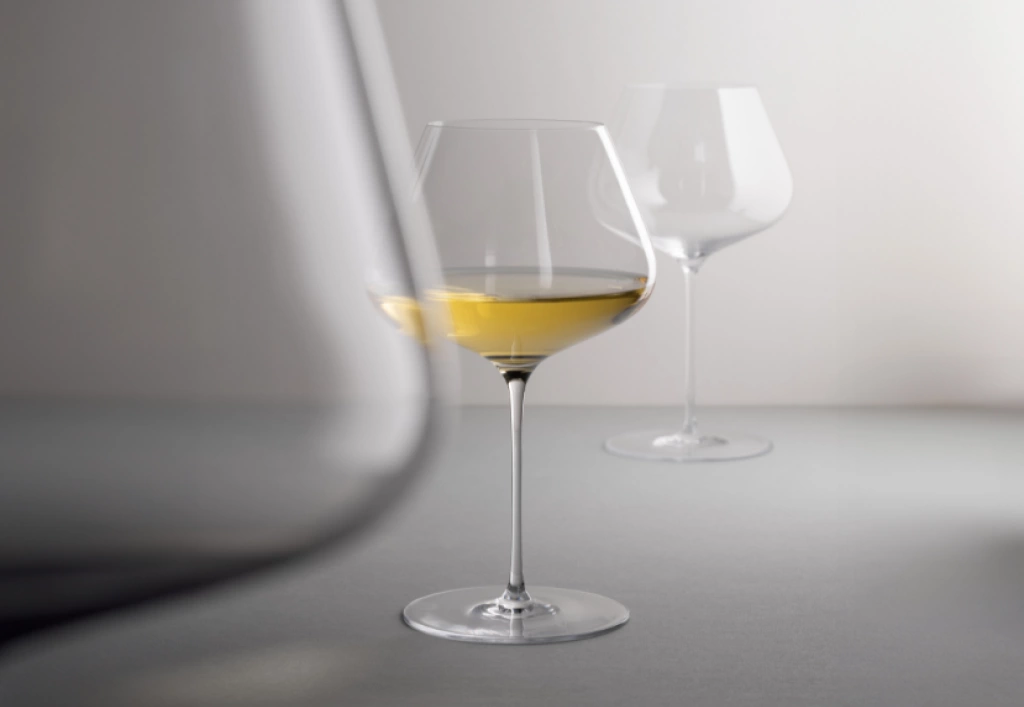
Zalto launches new ‘Balance’ glass on the market

Twenty years after the revolutionary Denk'Art series first became a favourite of wine experts worldwide, Zalto is launching a new glass. It bears the name ‘Balance’, and it is the first wine glass on the market that is deliberately dedicated to wines with a pronounced structure – regardless of the grape variety.
Father Hans Denk was the mastermind behind the wine glass series, which was launched in 2004. The Austrian priest, who possessed a phenomenal wine memory, aspired to create a ‘functional glass’ that was completely self-effacing, almost invisible and would show off the wine without any interference.
The new ‘Balance’ glass is designed with exactly the same principles in mind. However, it also takes into account vinification methods and ageing techniques that have received more attention globally in recent years, such as longer maceration times, mash fermentation, oxidation techniques and longer ageing on the lees. These and other methods result in wines that focus less on fruit and more on structure. ‘Balance’ aims to be the ideal partner to present tannins and other phenolics in a harmonious form without distorting the true character of the wines.
How does it look?
‘Balance’ is slightly smaller than the Denk'Art Bordeaux and Burgundy glasses, the characteristic angle of the glass is even more pronounced, and it has shorter sides. Its shape was largely developed by Managing Director Christoph Hinterleitner together with his brother Michael Hinterleitner. In-depth tastings over a two-year period and intensive dialogue with winegrowers and sommeliers proved that it was ideal for showing (white) wines in all their beauty, especially those with a strong structure. The same applies to whole-cluster fermented red wines, wines that have undergone extended maceration and complex sparkling wines which have long lees ageing and oxidative influence.

Vibrant wines
During the final years before his death in 2019, Father Hans Denk discovered his passion for (white) wines that were less fruit-driven and characterised by a complex structure and a slight phenolic note. “That's a great way to achieve a pronounced depth and vibrancy,” he said. Unfortunately, he was no longer able to define the glass shape for this style of wine himself.
Hand-blown on principle
Like every glass from Zalto Glasperfektion (Glass perfection), the ‘Balance’ glass is hand-blown. “Complex wines require a hand-blown glass,” explains Christoph Hinterleitner, “because the inner surface of the glass has a microscopically rougher surface – in contrast to the much smoother surface of machine-blown glass due to the different manufacturing process.”
The expression of the wine develops much more intensely on the rough particles than on completely smooth surfaces. This is readily apparent by conducting a tasting with a machine-made glass and a hand-blown glass of the same shape, side-by-side. “Skilful glass blowers are not easy to find – and production costs are significantly higher. Nevertheless, for us, there is no alternative to handmade production. The quality advantage is clear,” says Zalto co-founder and owner Josef Karner.

New generation at the start
Together with Martin Hinterleitner, Karner formed the team around mastermind Hans Denk. Together, they perfected the Denk'Art series with the characteristic angles developed by the “wine priest”, introduced the prototypes into production, presented them to winemakers and, in just a few years, made the glass series one of the most important in prestigious restaurants, wineries and wine bars around the world. Christoph and Michael Hinterleitner, who recently took over their father Martin's shares, are now paying tribute to the evolution of a different wine style with the launch of this ‘Balance’ glass.

Triumphal global march of Zalto’s Denk'Art
Zalto Denk'Art was born in the small village of Albrechtsberg in Lower Austria. There, Hans Denk served as a Catholic priest, famous for his rousing sermons and personable, philanthropic manner. Hans Denk was also known for his talent for tasting wines, describing and memorising them in an admirable way.
As early as the 1990s, he had a firm idea of a glass that would reflect wine with unrivalled precision. When initial contact was made with Zalto in the early 2000s to realise an ideal glass, Denk initially turned it down in the face of a competitor’s market dominance. However, seized by ambition, he then set about developing a glass that was entirely dedicated to wine. Its sole function was to serve as a neutral and almost invisible container for wines that are characterised by style and personality, but also perfectly balanced in terms of aesthetics and feel. The glass should not alter or even ‘embellish’ their expression, but rather reflect the wines in their purest form.
The result is a series of six glasses that can all be recognised by their characteristic angle. This shape emerged as the winner of all the tastings and testing. The fact that the angle of 24 degrees corresponds with the tilt of the Earth’s axis may be coincidential but this precise angle can be found in many technical applications dating back to ancient times…
In any case, after Martin Hinterleitner and Josef Karner joined Zalto and Kurt Zalto sold his shares in 2009 and left the company, Zalto Denk'Art quickly became the absolute favourite of wine-loving sommeliers and winemakers. In just a few years, Denk'Art has won over wine shops, wineries and restaurants all over the world. In France alone, 20 of the 30 three-star establishments now rely on Zalto. Wines are served in Denk'Art glasses in a total of 80 countries around the world.
Each of the more than 500,000 glasses produced each year is painstakingly hand-blown and handcrafted. This makes Zalto Denk’Art the most successful hand-blown wine glass series today. A success that Father Hans Denk only dreamed of in his wildest moments.
With ‘Balance’, Zalto is now continuing his vision of a glass that is completely subordinate to the needs of the wine.
Balance from Zalto Denk'Art will be available in stores from 23 September 2024 for € 47.90.
How Zalto Denk'Art is made
The production of a single glass takes several hours and involves at least seven people. To guarantee the filigree nature of the glass, the glass blower takes a perfect small mass of glass from a red-hot furnace and carefully blows it into a wooden mold. This creates wafer-thin side walls. The delicate stem is pulled by another person, while a third creates the fine base plate (also by hand). The glass then cools for several hours in what is known as an annealing lehr and the excess part of the goblet (which was the connection to the glassmaker’s pipe) is blasted off. The glass is then cut and polished. Every step requires perfection and the highest level of skill, so that only the most experienced masters can work on the production of a Zalto Denk'Art glass.
Around 50 glassblowers work year in, year out on the production of Zalto Denk'Art glasses. The company offers exclusively hand-blown glasses and exports to more than 80 countries. Zalto employs 20 people in Gmünd in the Waldviertel region of Lower Austria. Fifty glassblowers in neighbouring countries produce just over 500,000 glasses a year.
The Zalto Denk'Art range
With ‘Balance’, the Denk'Art wine universe now comprises seven glasses:
Universal
White wine
Burgundy
Bordeaux
Sweet wine
Sparkling wine
Balance NEW
There is also a very elegant water glass, a digestif and a beer glass. Carafes and decanters are also available.

Facts & Quotes
Zalto Denk’Art Balance
Art. Nr. 11151
Volume: 590 ml
Height: 195 mm
Diameter: 113 mm
Available from: 23. September 2024
RRP: € 47.90
‘Balance’ integrates, balances and harmonises without distorting the true character traits such as terroir and fruit. For wines that derive their balance and structure from phenolics, tannins, long lees ageing or deliberate use of wood.
Recommended for: wood-accentuated Chardonnay, mash-fermented white wines, whole-cluster-fermented red wines, wines that have undergone longer maceration time, as well as complex sparkling wines with long lees ageing and oxidative influence.
"Zalto glasses are the thinnest and most delicate glasses I have come across, yet seem springy and almost elastic in the hand – and would give any serious wine lover a real thrill over the closeness of contact they offer." – Jancis Robinson MW, Financial Times
Downloads

























